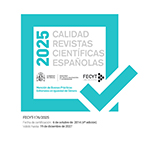¿Cómo motivan los profesionales del ámbito educativo a su alumnado con necesidades específicas de apoyo educativo?
Resumen
La motivación académica del alumnado está considerada como uno de los elementos más relevantes para su éxito y el rendimiento académico. Su estudio ha sido desarrollado fundamentalmente desde una perspectiva interna del propio alumnado. Sin embargo, dicha motivación académica está influida también por los elementos del entorno, entre los que destaca el papel del profesorado. Esta función motivadora será especialmente relevante en el caso del alumnado con necesidades específicas de apoyo educativo. Pese a ello, esta línea de investigación ha sido prácticamente inexistente.
Se ha utilizado una muestra de 796 profesionales del ámbito educativo, mayoritariamente maestros y profesores, que desarrollan su actividad educativa con alumnado con Necesidades Específicas de Apoyo Educativa (NEAE) de 3 a 16 años. Se han realizado análisis descriptivos, correlacionales e inferenciales.
Los resultados obtenidos nos informan sobre cómo los profesionales del ámbito educativo utilizan los distintos tipos de conductas motivadoras con su alumnado. Así, hemos obtenido una mayor utilización de la generación de expectativas y refuerzos positivos, mientras que la menor utilización se produce en la generación de meta de autofrustración del ego. Además, se han obtenido diferencias significativas con respecto al sexo, a la profesión, a la ubicación, a la edad y a la experiencia.
Este estudio nos ha servido para arrojar algo de luz sobre cómo los distintos profesionales del ámbito educativo motivan a su alumnado, lo cual tiene importantes implicaciones para la práctica educativa y más directamente para el papel que debe desempeñar el profesorado en relación con su alumnado.
Descargas
Descarga artículo
Licencia
La Revista Complutense de Educación, para fomentar el intercambio global del conocimiento, facilita el acceso sin restricciones a sus contenidos desde el momento de su publicación en la presente edición electrónica, y por eso es una revista de acceso abierto. Los originales publicados en esta revista son propiedad de la Universidad Complutense de Madrid y es obligatorio citar su procedencia en cualquier reproducción total o parcial. Todos los contenidos se distribuyen bajo una licencia de uso y distribución Creative Commons Reconocimiento 4.0 (CC BY 4.0). Esta circunstancia ha de hacerse constar expresamente de esta forma cuando sea necesario. Puede consultar la versión informativa y el texto legal de la licencia.











